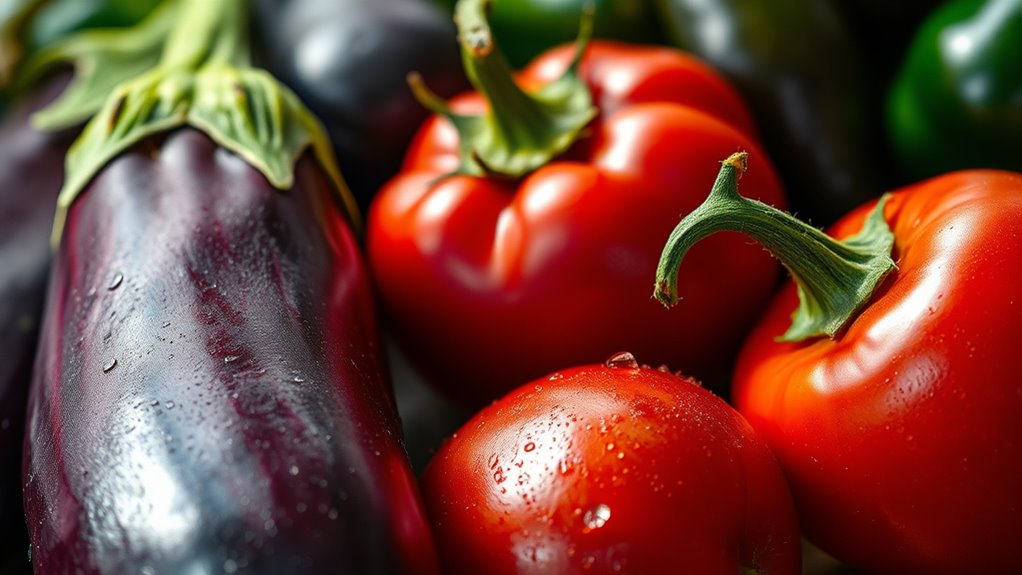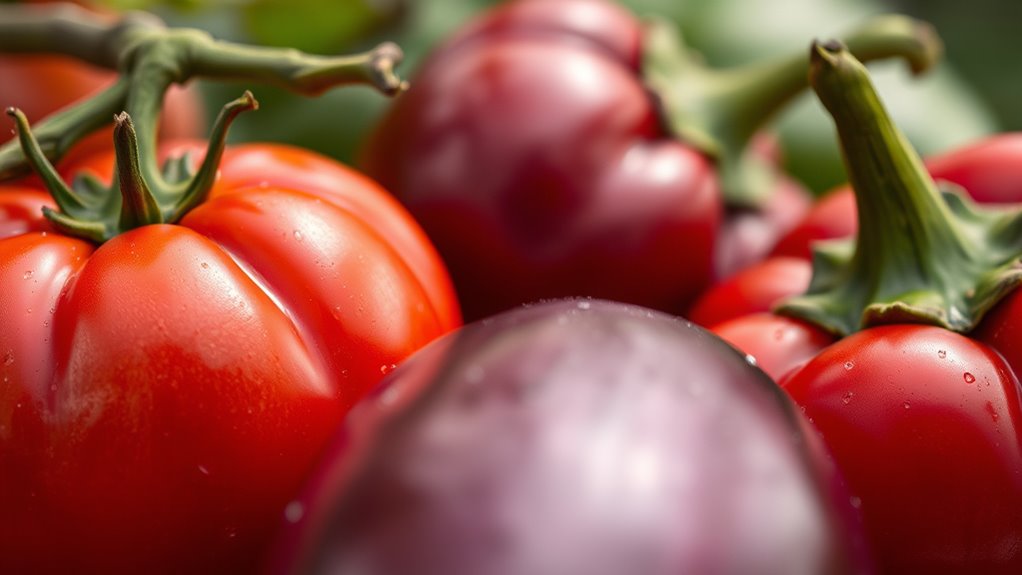Nightshades like tomatoes, peppers, and eggplants contain alkaloids that some believe cause inflammation or worsen autoimmune symptoms. While some individuals report relief from symptoms after reducing these vegetables, research shows that, for most people, nightshades are safe and nutritious. It’s important to recognize personal sensitivities, as reactions vary. To understand if they affect you, consider an elimination diet. If you keep exploring, you’ll discover how science and personal experience help clarify the truth behind nightshades and inflammation.
Key Takeaways
- Nightshades contain alkaloids like solanine, which may trigger inflammation in sensitive individuals.
- Not everyone reacts negatively; many tolerate nightshades without inflammation or autoimmune issues.
- Reducing or eliminating nightshades can improve symptoms for some with autoimmune or inflammatory conditions.
- Nutritional benefits of nightshades, such as vitamins and antioxidants, support health for most people.
- Scientific evidence is mixed; individual responses vary, making personalized dietary assessments essential.

Nightshades are a group of vegetables and herbs that contain naturally occurring compounds called alkaloids, which can sometimes trigger inflammation in sensitive individuals. If you’ve experienced unexplained joint pain or digestive issues, you might wonder if nightshades are to blame. One concern is solanine toxicity, a type of alkaloid found in some nightshades like potatoes, especially when they’re green or sprouted. Solanine can cause symptoms like nausea, headaches, and neurological discomfort if consumed in large amounts. While rare, solanine poisoning sheds light on how sensitive some people might be to these compounds. This toxicity isn’t common with typical dietary intake but underscores why some individuals choose to limit nightshade consumption. Another critical aspect is that alkaloids in nightshades can act as autoimmune triggers. For people with autoimmune conditions such as rheumatoid arthritis or lupus, these compounds might exacerbate inflammation or stimulate immune responses that worsen symptoms. Although scientific evidence varies, many report improvements when reducing or eliminating nightshades from their diets, suggesting a link between alkaloids and autoimmune activity. You might notice that your symptoms flare up after eating tomatoes, peppers, or eggplants, which are rich in alkaloids. In these cases, it’s worth considering whether nightshades contribute to your inflammation. It’s important to recognize that not everyone reacts the same way. Many people consume nightshades daily without issues, and these vegetables are packed with nutrients like vitamins A and C, antioxidants, and fiber. The key is paying attention to your body’s responses. If you suspect nightshades impact your health, try an elimination diet—cutting them out for a few weeks and then reintroducing them gradually while monitoring your symptoms. This process can help you determine whether nightshades are an autoimmune trigger or if your inflammation stems from other causes. Keep in mind that the concept of solanine toxicity is mostly relevant in cases of overconsumption or poor storage, not typical culinary use. Likewise, the idea that nightshades universally cause inflammation is more nuanced; some people are more sensitive due to genetic factors or existing health conditions. Additionally, certain nutrients in nightshades like vitamins A and C, antioxidants, and fiber, contribute positively to overall health. Consulting a healthcare professional or dietitian can offer personalized guidance. Ultimately, understanding how your body reacts to nightshades helps you make informed choices. Whether you decide to limit or include these vegetables, knowing the potential for solanine toxicity and autoimmune triggers empowers you to manage inflammation more effectively.
Frequently Asked Questions
Are Nightshades Safe for Everyone to Eat?
You might wonder if nightshades are safe for everyone to eat. While they have a long history of culinary uses worldwide, some people with sensitivities or certain health conditions should be cautious. Nightshade history shows their versatility in dishes, but individual reactions vary. If you notice inflammation or discomfort, consider limiting or avoiding them. Always listen to your body and consult a healthcare professional if unsure.
Can Nightshades Cause Autoimmune Diseases?
You might think nightshades are harmless, but in reality, they could be the sneakiest autoimmune triggers out there. If you have nightshade sensitivity, consuming them might ignite your immune system, potentially worsening autoimmune diseases. While not everyone gets affected, for some, these vegetables could act like hidden enemies, making you wonder if they’re causing more harm than good. Always listen to your body and consult your healthcare provider.
How Quickly Do Nightshades Affect Inflammation Levels?
You might wonder how quickly nightshades influence inflammation levels. The timing of symptoms varies depending on your individual sensitivity. Some people notice changes within hours, while others see effects after several days of consumption. If you’re sensitive, you could experience inflammation shortly after eating nightshades, but if you’re less reactive, it may take longer. Tracking your responses helps determine how quickly these foods impact your inflammation levels.
Are There Natural Remedies to Counteract Nightshade-Related Inflammation?
If you’re concerned about nightshade-related inflammation, natural remedies may help. You can try herbal supplements like turmeric or ginger, known for their anti-inflammatory properties. Following anti-inflammatory diets rich in fruits, vegetables, and omega-3s can also reduce inflammation. Remember, individual responses vary, so it’s best to consult with a healthcare professional before making significant changes. These approaches can support your efforts to manage inflammation naturally.
Do Cooking Methods Influence Nightshade’s Inflammatory Properties?
Imagine opening a treasure chest; the way you cook can reveal or hide its riches. Cooking techniques like boiling or peeling nightshades can soften their structure, possibly reducing inflammatory compounds. These methods also help retain nutrients while minimizing potential irritants. So, your choice of cooking not only influences nutrient retention but may also lessen nightshades’ inflammatory effects, making them easier on your body and more enjoyable to include in your diet.
Conclusion
So, next time you reach for that tomato or spicy pepper, remember, you hold the power to tame or ignite your inflammation storm. Don’t let fear of nightshades turn your kitchen into a battlefield—you’re the commander of your health. With a little knowledge, you can conquer myths and discover the true potential of these vibrant foods. Embrace or avoid, but never underestimate their mighty influence on your body’s fiery balance!










